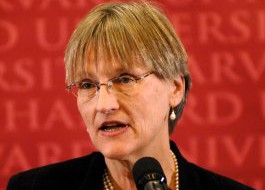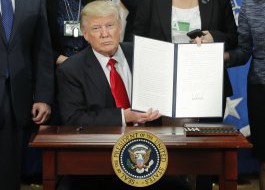
Harvard, Stanford, Yale, and 14 other universities filed an amicus brief on Monday challenging President Donald Trump's immigration order.
The brief stated that the executive order has already caused "damaging effects" at American universities.
"These costs are significant and directly affect amici's ability to pursue their missions," the brief read. "And they are being experienced absent any evidence that amici's lawfully-present students, faculty, and scholars—all of whom have already undergone significant vetting by the government—pose any threat to the safety or security of the United States or amici's campuses."
The brief, filed in the US District Court for the Eastern District of New York, was signed by the presidents of Brown, Carnegie Mellon, University of Chicago, Columbia, Cornell, Dartmouth, Duke, Emory, Harvard, Johns Hopkins, MIT, Northwestern, University of Pennsylvania, Princeton, Stanford, Vanderbilt, and Yale.
The brief adds to mounting backlash from the higher education community over an executive order signed by Trump that bars citizens of Iran, Iraq, Libya, Somalia, Sudan, and Yemen from entering the US for 90 days and bars Syrians indefinitely. The order, signed on January 30, also halted all refugee immigration to the US for 120 days.
The order is temporarily on hold after a federal judge in Seattle issued a temporary restraining order on enforcement of the ban and the 9th US Circuit Court of Appeals upheld the ruling.
The Ninth Circuit court, which decided last week to uphold the temporary restraining order, ruled that "under the 'third party standing' doctrine, injuries to the state universities give the states standing to assert the rights of the students, scholars, and faculty affected by the Executive Order."
"The Executive Order prevents nationals of seven countries from entering Washington and Minnesota," the Ninth Circuit judges wrote. "As a result, some of these people will not enter state universities, some will not join those universities as faculty, some will be prevented from performing research, and some will not be permitted to return if they leave."
In early February, the presidents of 48 American colleges and universities delivered a searing letter Trump taking aim at his order's "extreme vetting" procedures.
The letter, drafted by Princeton's president, Christopher L. Eisgruber, and the University of Pennsylvania's president, Amy Gutmann, and signed by 40 other college presidents said:
"This action unfairly targets seven predominantly Muslim countries in a manner inconsistent with America's best principles and greatest traditions. We welcome outstanding Muslim students and scholars from the United States and abroad, including the many who come from the seven affected countries ... This executive order is dimming the lamp of liberty and staining the country's reputation. We respectfully urge you to rectify the damage done by this order."




